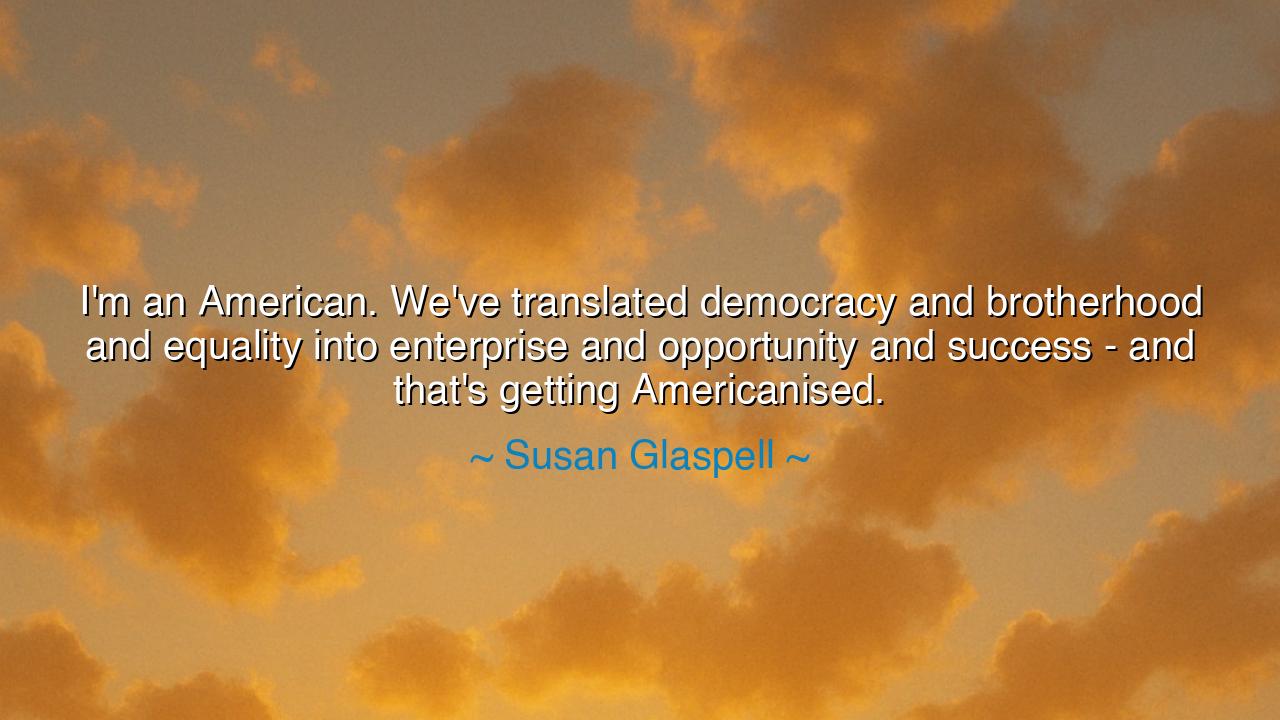
I'm an American. We've translated democracy and brotherhood and
I'm an American. We've translated democracy and brotherhood and equality into enterprise and opportunity and success - and that's getting Americanised.






Hear now the words of Susan Glaspell, playwright, thinker, and witness to the changing face of a young nation: “I'm an American. We've translated democracy and brotherhood and equality into enterprise and opportunity and success—and that's getting Americanised.” In these lines she lays bare the spirit of her homeland, a land where lofty ideals were reshaped into practical pursuits, where the sacred principles of democracy, brotherhood, and equality were not left to linger in the clouds, but were brought down to earth and reborn as enterprise, opportunity, and success. Her words are at once proud and reflective, both a celebration and a subtle warning.
The meaning of her statement is layered. To be Americanised, she suggests, is to transform ideals into action, to take the abstract dream of liberty and translate it into tangible achievements. Where other nations might speak endlessly of equality, Americans sought to measure it in chances offered and fortunes made. Where others might chant brotherhood as a spiritual bond, Americans turned it into opportunity shared through industry and commerce. Thus, the essence of the republic was found not only in words but in deeds, not only in philosophy but in the building of towns, businesses, and lives.
The origin of this thought rests in the character of America itself. Born in revolution, the nation declared its devotion to liberty and equality, but it was upon the frontier, in the factories, and in the marketplaces that these ideals took their true form. The pioneers, the immigrants, the workers—all carried within them the dream of freedom, but they expressed it by striving, by laboring, by transforming their hope into success. Glaspell, with clear eyes, saw this transformation: ideals alone could not satisfy the American spirit; they had to be embodied in action.
History bears this out. Consider the story of Andrew Carnegie, a poor boy from Scotland who arrived in America with nothing. In the Old World, his fate might have been sealed by class and poverty. But in America, his ideals of opportunity translated into relentless effort, until he rose to become one of the greatest industrialists of his time. His life embodied Glaspell’s truth: democracy became not only a voice at the ballot box but also a chance to climb, to succeed, to create. And yet his story also warns us, for though he built vast wealth, inequality persisted, reminding us that ideals can be twisted when translated into the language of enterprise.
Glaspell’s words carry both pride and unease. Pride, because the translation of ideals into action gave America its vitality, its dynamism, its ceaseless movement. Unease, because in that translation, something may be lost. If brotherhood becomes merely business partnership, if equality becomes nothing more than opportunity for those already advantaged, then the sacred essence of the ideals is diminished. To be “Americanised” is powerful, but it can also be perilous if success is mistaken for justice, or enterprise for true brotherhood.
The lesson is clear: do not forget the roots of your striving. Let enterprise be noble, but remember it was born from democracy. Let opportunity abound, but remember it is meant to serve equality. Let success shine, but never let it eclipse brotherhood. Glaspell reminds us that action and achievement are good, but only if they remain faithful to the ideals from which they spring. For when prosperity forgets justice, or ambition forgets compassion, the translation becomes distortion, and the heart of the dream is lost.
So, children of tomorrow, live by this teaching. Build, strive, and labor for success, but let your hands remember the spirit of democracy, equality, and brotherhood. When you create enterprise, let it uplift not only yourself but others. When you find opportunity, share it with those who hunger for it. When you taste success, use it to strengthen justice. For to be truly Americanised—or to live truly in the spirit of freedom anywhere—is not merely to prosper, but to ensure that prosperity honors the ideals from which it was born. In this way, the translation of ideals into deeds becomes not a loss, but a fulfillment.






AAdministratorAdministrator
Welcome, honored guests. Please leave a comment, we will respond soon